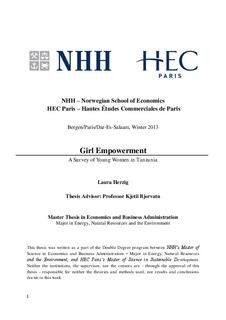| dc.description.abstract | This study is a contribution to the Girl Empowerment Project launched by Christian Michelsen Institute (CMI) in cooperation with NHH Norwegian School of Economics, Femina HIP, the Economic and Social Research Foundation (ESRF), and the Development Pioneer Consultants (DPC). Teenage pregnancies have emerged as one of the main challenges to current public and educational policies in Tanzania. Recent statistics show a clear and increasing link between early pregnancies and school drop-outs, as well as higher maternal and infant mortality. Existing literature suggests that postponing the initial age of childbirth amongst young women in Tanzania positively impacts their professional and personal development. Starting a family at a later state in life substantially increases their chances of finishing secondary school and becoming economically active throughout their lifetime. Given those positive social and economic side effects of postponing motherhood, the big challenge faced by policy makers is to find the right motivational tool to address the target group. As a contribution to those efforts, the Girl Empowerment Project suggests two different interventions, a health information campaign and economic empowerment training. The project is designed as a randomized field experiment, where schools are offered (1) a health program, (2) an economic empowerment program, (3) both programs, or (4) no program (control group). Baseline data was collected during April 2013, while the programs were implemented from July to early September 2013. The first round of follow-up studies took place from late September to October 2013. The current thesis makes use of the baseline data and analyses the level of health and entrepreneurship knowledge among the girls in the sample. Furthermore, it studies how these types of knowledge correlate with a more empowered attitude and behavior documented in the baseline survey. Investigating the link between health and business knowledge and the girls’ fertility and economic aspirations, the study at hand provides some useful insights into whether or not we can expect either one of the interventions to be successful. However, while the overarching Girl Empowerment Project investigates the causal impact of the different training programs on outcomes, the current thesis relies on correlations and the evidence is thus suggestive. Nevertheless, the findings imply that a higher level of business knowledge is indeed associated with a more empowered behavior among survey participants, reducing their vulnerability to early pregnancy. Health knowledge on the other hand depicts the same tendency as business knowledge but proves to be of less statistical significance. | nb_NO |
